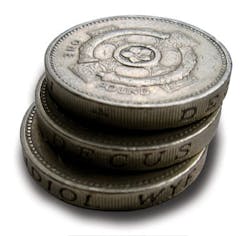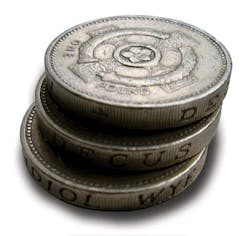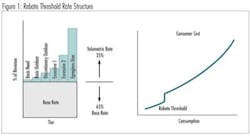Direct Drive Conservation – Using Information and Incentives to Save Water
By Graham Symmonds
The evolution of the Smart Grid for Water and rate designs have progressed to the point where utilities can now actively engage consumers in real-time, conscious reduction in consumption. Automated metering systems help water agencies monitor and immediately report water use, dramatically increasing the visibility of water, and providing to consumers the necessary feedback to achieve sustained conservation.
Water scarcity is a looming problem and changing individual behavior to compensate is a key element of sustainability. Unfortunately, the economic value of water and the consumer's experiential understanding of where, when and how they consume water stands in the way. The evolution of the Smart Grid for Water and rate designs have progressed to the point where utilities can now actively engage the end consumer in "direct-drive conservation": the real-time, conscious reduction in consumption.
For the first time water agencies have the ability to monitor and immediately report water use, dramatically increasing the visibility of water, and providing to consumers the necessary feedback to achieve sustained conservation. Further, through effective rate design, consumers can be financially rewarded for conservation.
Editors note: Graham Symmonds is Chief Technology Officer for Global Water Resources, a company that owns and operates regulated water and wastewater utilities and is active in the field of Total Water Management. The company also markets Fathom™ – an integrated suite of technology products designed to bring heightened efficiencies to utility operations.
Messaging
Water conservation has become a major theme of many utilities. Websites and utility customer care centers are replete with exhortations to turn off the tap while brushing your teeth, to stop irrigating your lawn in the rain, to not use your hose as a brush for your driveway. These messages are important but often fall short of measurable impact. Water managers have been so successful in engineering solutions to our water needs that the average consumer not only believes that clean and plentiful water must be available on demand, but they pass not a thought about the complexity of this service. The ignorance of the personal impact each consumer has on our water resources is a major hurdle to sustainability. A shift to a water scarcity message can be more effective in this regard.
Global Water's view is that the volatility of water resources in the face of an increasingly erratic climate system is rapidly driving our past engineering-centered water management polices into obsolescence. To be sustainable, we need to adopt a distributed approach to the demand management – and that means engaging the consumer at a fundamentally more granular level.
Data Granularity
A utility can tell you to the millisecond when a booster pump turned on; however, in many cases it cannot tell you until next month – or the month after, or six months later – where that water went. That's not acceptable. In a world where every drop counts, instantaneous understanding of the entire water system is required.
Further, continuity of revenue is now a major concern for utilities in a time of shrinking population bases and dwindling budgets. And for consumers, that means costs are going up.
Increasing price certainly makes people more aware of their usage. In 2009, Boenning & Scattergood noted: "as with the sudden interest in fuel-efficient cars in the U.S., consumers generally become much more interested in conservation and efficiency when the price of the commodity in question - be it oil or water - becomes high enough to provide that motivation."
In other words, when water is cheap, no one notices. As prices increase, people look to control their consumption. To do so requires data – data that most utilities cannot readily supply. However, given access to highly granular, time-relevant data, consumers can make dramatic changes in consumption. A recent study completed by California State University indicated that through the provision of instantaneous feedback on water consumption, average water consumption reductions in the order of 14% can be achieved.
In addition, subtle societal pressures can be reinforced with access to such data. Robert Cialdini, a psychologist at Arizona State University, recently noted: "People don't recognize how powerful the pull of the crowd is on them…We can move people to environmentally friendly behavior by simply telling them what those around them are doing."
To make a rational decision about water use, the consumer needs to have the opportunity to review daily consumption, and make a value decision based on that information. To be successful in reducing consumption, people must be given the "geo-temporal" context of their consumption: where, when and why am I using water.
By employing such a system, the consumer is afforded the opportunity to pause, and ask the questions: "Do I need to use that gallon of water?" and "Am I prepared to incur the costs of using that next gallon of water?"
The need for data to make decisions is a well worn business mantra. But it also applies to consumers. Jesse Berst, popular speaker and Smart Grid expert, recently opined "consumers want highly personalized information and they want it at any time on any device – Web, TV, print, smart phone."
It is for this reason that the information presentment options are converging to mobile devices like Global Water Fathom's iPhone application. This application is one of the first commercially available water conservation/consumption data delivery tools for consumers, and allows utility customers to access near-real-time consumption data and billing information.
Pricing
No talk about conservation can exist without an effective pricing mechanism. If water does not have real monetary value, consumers will not conserve. Scott Hempling of the National Regulatory Research Institute notes:
"Rate design is the key to consumer protection. To moderate cost increases, we must moderate the demands that cause costs. Rate design offers the double anti-oxymoron: price increases are consumer protection, because (1) price increases change behavior and (2) behavior change yields lower total costs."
On average, a 10% increase in the marginal cost of water can be expected to reduce residential demand by 3-4% in the short run. In the long term, such an increase could be expected to yield a 6% decrease in demand.
Clearly, price sensitivity to water resulting in demand reductions will reduce utility revenue. A true conservation-oriented rate structure must take into account this revenue destruction that is concomitant with demand reduction.
In Global's case, we developed an innovative rate design that both rewards the consumer for conservation activity, and ensures the financial stability of the utility. This rate design is known as the Rebate Threshold Rate (RTR) structure. The RTR works by adopting three basic elements:
- Volumetric rebate. Any time a customer achieves a consumption level below the Rebate Threshold, the customer is entitled to receive a reduction in volumetric charges (commodity charges). That reduction is typically 45% to 65%. This reduction is shown as a "conservation rebate" on the consumer's invoice.
- Increasing the number and granularity of tiers. An increase in the number and granularity of tiers in the RTR structure ensures that there are a greater number of decision gates presented to the consumer as consumption increases.
- Achieving some measure of rate decoupling by increasing the fixed rate component. By generating approximately 65% of the revenue from monthly base fees, the financial viability of the utility can be assured. This is recognition that the fixed costs do not simply represent infrastructure, but the "operational availability" of infrastructure.
Conclusions
By applying these elements of pricing signals and information to Global's own utilities, we have seen an average sustained reduction in demand of 16%.
The world of water resources management is changing rapidly – scarcity and price increases are a certainty. To adapt utilities must, as Dr. Peter Gleick of the Pacific Institute noted, seek to increase sustainability through "efficiency, smart economics, advanced technology and better governance and water management".
The water utility of the 21st century must not only increase the availability of data, but must get that information out to consumers. In doing so, when combined with the right economics, dramatic and sustained reductions in demand can be achieved. And our natural resources sustained for the future. WW
About the Author: Graham Symmonds is the Chief Technology Officer and Senior Vice President of Regulatory Affairs & Compliance with Global Water Resources. He has a degree in Mechanical Engineering from the University of Toronto and completed post graduate training at the Royal Naval Engineering College in Plymouth UK. He has spent 17 years in the water industry after serving in the Canadian Navy for 9 years.
More WaterWorld Archives Issue Articles



